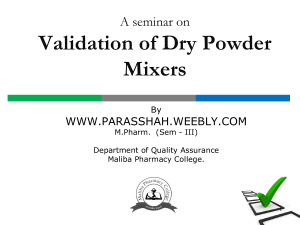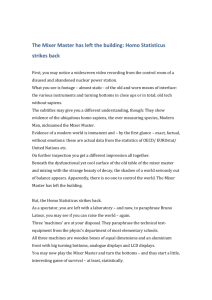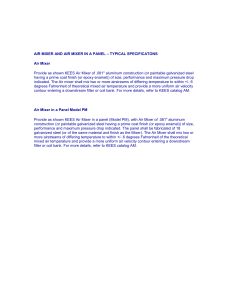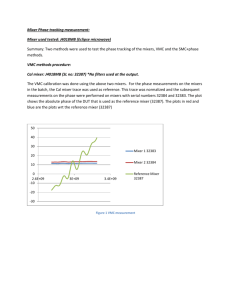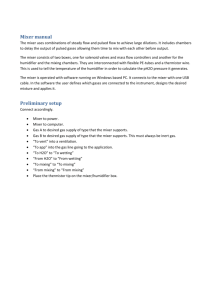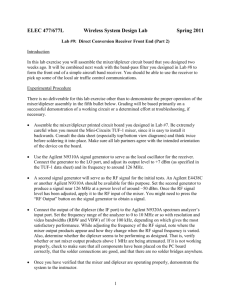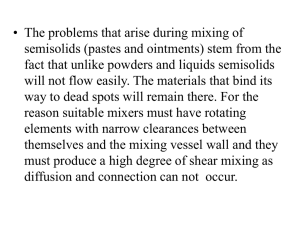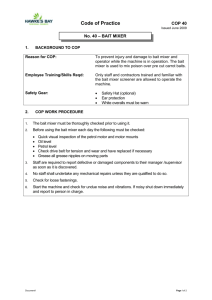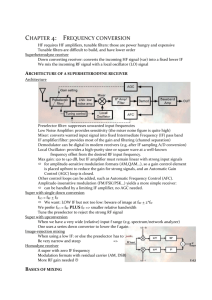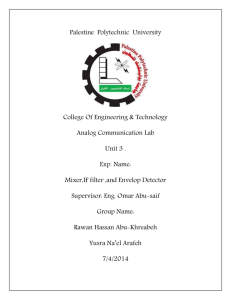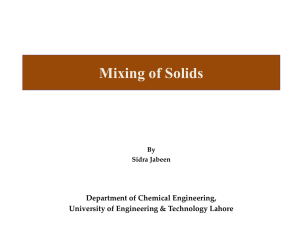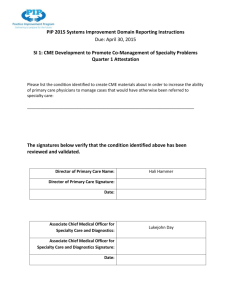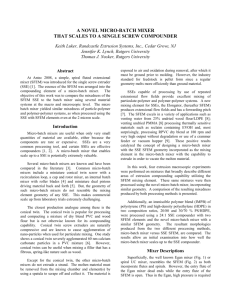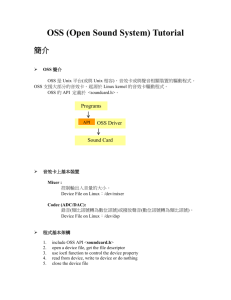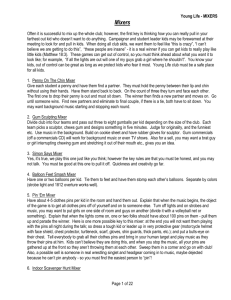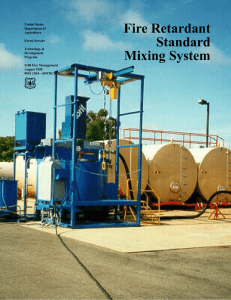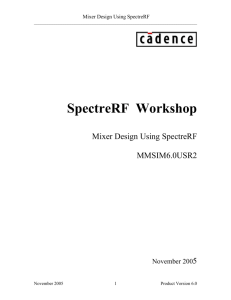- Mexichem
advertisement
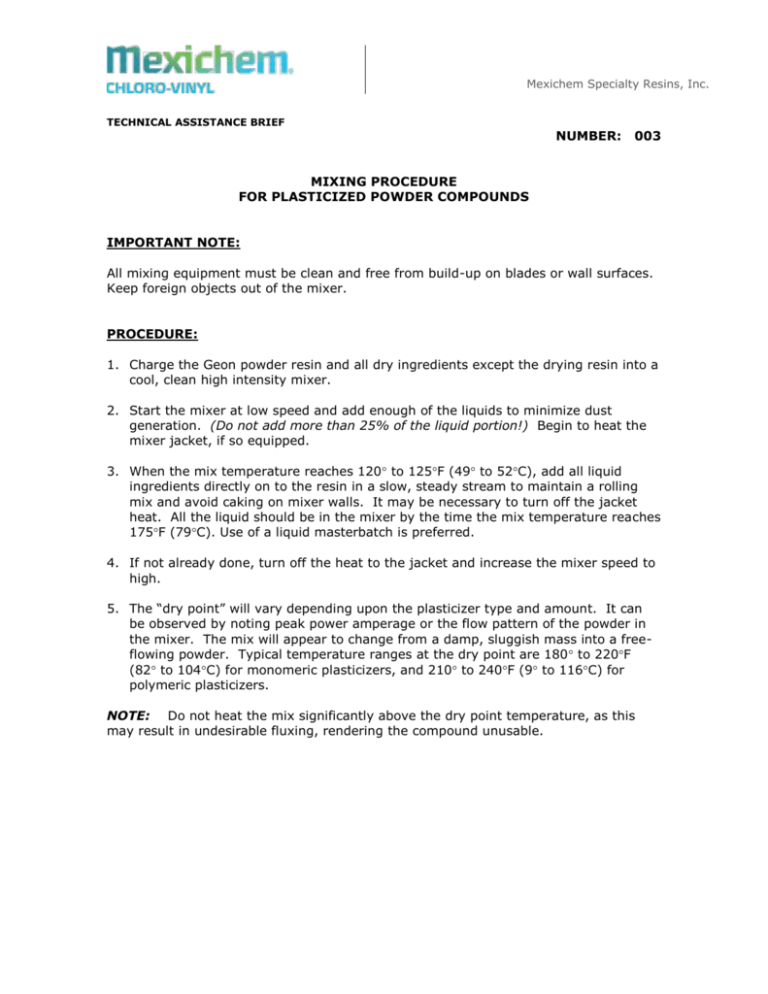
Mexichem Specialty Resins, Inc. TECHNICAL ASSISTANCE BRIEF NUMBER: 003 MIXING PROCEDURE FOR PLASTICIZED POWDER COMPOUNDS IMPORTANT NOTE: All mixing equipment must be clean and free from build-up on blades or wall surfaces. Keep foreign objects out of the mixer. PROCEDURE: 1. Charge the Geon powder resin and all dry ingredients except the drying resin into a cool, clean high intensity mixer. 2. Start the mixer at low speed and add enough of the liquids to minimize dust generation. (Do not add more than 25% of the liquid portion!) Begin to heat the mixer jacket, if so equipped. 3. When the mix temperature reaches 120 to 125F (49 to 52C), add all liquid ingredients directly on to the resin in a slow, steady stream to maintain a rolling mix and avoid caking on mixer walls. It may be necessary to turn off the jacket heat. All the liquid should be in the mixer by the time the mix temperature reaches 175F (79C). Use of a liquid masterbatch is preferred. 4. If not already done, turn off the heat to the jacket and increase the mixer speed to high. 5. The “dry point” will vary depending upon the plasticizer type and amount. It can be observed by noting peak power amperage or the flow pattern of the powder in the mixer. The mix will appear to change from a damp, sluggish mass into a freeflowing powder. Typical temperature ranges at the dry point are 180 to 220F (82 to 104C) for monomeric plasticizers, and 210 to 240F (9 to 116C) for polymeric plasticizers. NOTE: Do not heat the mix significantly above the dry point temperature, as this may result in undesirable fluxing, rendering the compound unusable. Mexichem Specialty Resins, Inc. TAB-003 Mixing Procedure for Powder Compounds Page 2 of 3 6. Transfer the mix to the cooling mixer. Start the mixer at low speed and cool the compound to 120F (49C) or lower (90F [32C] is preferred). 7. Continue to operate the mixer at low speed and once the mix is below 120ºF (49ºC), add the drying resin to the cooling mix. Thoroughly disperse it for one to two minutes. Times will vary depending on type of cooling mixer used. Do not allow the temperature of the mix to exceed 120F (49C). 8. Screen the powder through a 20 to 40 mesh screen to remove any agglomerates formed during mixing. The amount of agglomerates will vary based on recipe and specific equipment configuration. NOTE: The temperature of finished powder compound must be cooled to at least 90F (32C) prior to packaging. This will prevent caking or thermal deterioration of the compound in the container. TIPS AND PRECAUTIONS FOR PLASTICIZED POWDER COMPOUND MIXING 1. Do not over heat the resin before adding plasticizers, since selective absorption of liquids may take place. 2. Pre-blending liquids (liquid masterbatch) will give a more homogenous mix in most cases. It is recommended that liquid ingredients be used in place of dry components whenever possible (i.e., liquid stabilizers, pigment pastes [pre-dispersed is preferred], etc.). 3. Do not overload the mixers. 4. Heat may be used on the high intensity mixer jacket, but it is not necessary. heat may be adequate. Cycle time will be longer without jacket heating. Frictional 5. Drop the mix by temperature or power peak, not based on time. Variables in heat-up times, ingredient temperature, operation efficiency, etc., will not be compensated if a time cycle is used. A power recording chart will give better control of dry point. After a few batches have been made and proper final dryness of the mix has been established, a reproducible drop point may be established. 6. It may be helpful to preheat polymeric plasticizers before adding them to the mix in order to lower viscosity and improve mixing efficiency. Mexichem Specialty Resins, Inc. © Mexichem Specialty Resins, Inc. 2013 The information contained herein is believed to be reliable, but no representations, guarantees or warranties of any kind are made as to its accuracy, suitability for particular applications or the results to be obtained therefrom. The information is based on laboratory work with small-scale equipment and does not necessarily indicate end product performance. Because of the variations in methods, conditions and equipment used commercially in processing these materials, no warranties or guarantees are made as to the suitability of the products for the application disclosed. Full-scale testing and end product performance are the responsibility of the user. Mexichem Specialty Resins, Inc. shall not be liable for and the customer assumes all risk and liability of any use or handling of any material beyond Mexichem Specialty Resins, Inc.’s direct control. The SELLER MAKES NO WARRANTIES, EXPRESS OR IMPLIED, INCLUDING, BUT NOT LIMITED TO, THE IMPLIED WARRANTIES OF MERCHANTABILITY AND FITNESS FOR A PARTICULAR PURPOSE. Nothing contained herein is to be considered as permission, recommendation, nor as an inducement to practice any patented invention without permission of the patent owner. TAB-003 Mexichem Specialty Resins, Inc. JUL 2013
